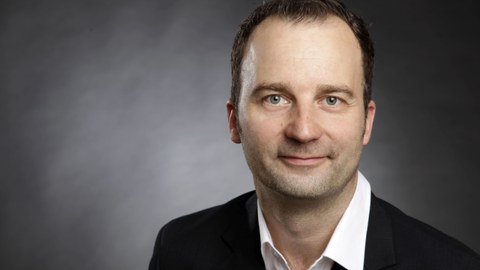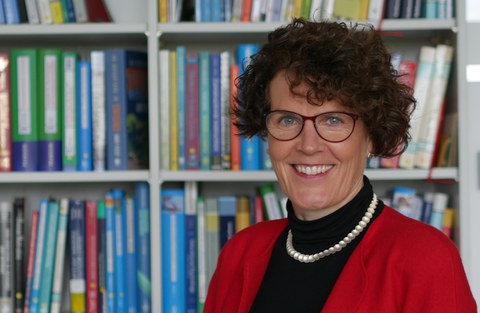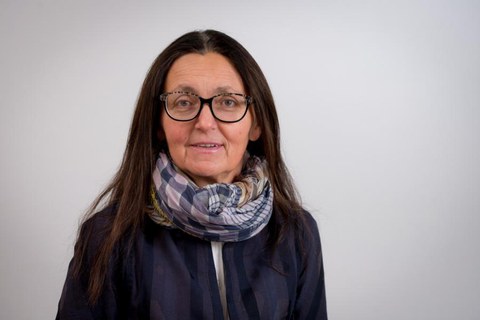Lehrende
Immer an Ihrer Seite
Unser engagiertes Team von Lehrenden begleitet Sie während Ihres gesamten Studiums. Sie stehen Ihnen nicht nur als Wissensvermittler:innen von Fakten und Methoden zur Verfügung, sondern sind auch Ihre Ratgeber:innen, Unterstüzer:innen und Mentor:innen auf Ihrem akademischen Weg. Lernen Sie hier die vielfältigen Persönlichkeiten kennen, die mit Leidenschaft und Fachkompetenz daran arbeiten, Ihnen ein erfolgreiches Studienerlebnis zu bieten.
Prof. Dr. Sebastian Pannasch
Professur für Ingenieurpsychologie und angewandte Kognitionsforschung
Ich sehe den Vorteil des Masterprogramms in der Breite der relevanten Zugänge zu komplexen Soziotechnischen Systemen. Um die Relevanz der jeweiligen Themen für die Studierenden möglichst klar hervorzuheben, verdeutliche ich komplexe Sachverhalte anhand eingängiger Beispiele bzw. erläutere die Zusammenhänge in direktem Bezug zu alltagsnahen Situationen. Durch die kritische Auseinandersetzung mit Ergebnissen wissenschaftlicher Studien versuche ich das Verständnis der Inhalte ebenso wie die Herangehensweise an die praktische Arbeit während und nach dem Studium zu erleichtern.
Bitte stellen Sie sich und Ihren Forschungsbereich vor.
Die Ingenieurpsychologie ist eine Teildisziplin der Psychologie an der Schnittstelle zu den technischen Anwendungen. Das Ziel der Ingenieurpsychologie besteht in der Gestaltung und Optmimierung von Mensch Technik Interaktion aus der Perspektive des Menschen. Die Einbeziehung der Erkenntnisse aus der Psychologie soll dazu beitragen, Systeme zu entwickeln, die leichter benutzbar und sicherer sind.
Ich bin seit ca. 25 Jahren in diesem Gebiet tätig und finde das Spannungsfeld zwischen Grundlagen- und anwendungsbezogener Forschung besonders interessant. Dafür nutze ich insbesondere Blickbewegungsmessung.
Welche aktuellen Entwicklungen in Ihrem Fachgebiet finden Sie für Studierende besonders wichtig?
Der technische Fortschritt scheint ständig schneller zu werden, dabei die Perspektive von uns Menschen im Blick zu halten erscheint mir extrem wichtig.
Was ist Ihr Lieblingsaspekt Ihrer Tätigkeit als Dozent:in?
Die Möglichkeit Interesse zu wecken und zum Nachdenken anzuregen.
Was ist das Besondere am HPSTS-Studium in Dresden?
Die Breite der angebotenen anwendungsbezogenen Themen gepaart mit der Möglichkeit individueller Schwerpunktsetzung.
Welche Fragen sollte man sich stellen, wenn man bei der Studienwahl unsicher ist?
Was macht mir Spaß, worauf habe ich keine Lust. Auf diese Weise lassen sich die Möglichkeiten eingrenzen.
Welchen Rat würden Sie Studienanfänger:innen geben?
Professionalität ist Gelassenheit! Das Studium haben auch schon viele andere erfolgreich gemeistert.
Dr. Matthias Rudolf
Professur für Methoden der Psychologie und kognitive Modellierung
Fundierte methodische Kenntnisse sind in der Berufs- bzw. Forschungspraxis von großer Bedeutung. Deshalb bieten wir eine anwendungsbezogene Ausbildung in komplexen multivariaten Verfahren anhand von moderner Statistik-Software an. Die Studierenden erwerben so die notwendigen Kenntnisse, um eigene Untersuchungen sachgerecht planen und auswerten zu können.
Bitte stellen Sie sich und Ihren Forschungsbereich vor.
Zentraler Forschungsschwerpunkt der Professur für Methoden der Psychologie und kognitive Modellierung ist der Themenbereich der komputationalen Modellierung kognitiver Prozesse unter Leitung von Prof. Stefan Scherbaum.
Ich selbst beschäftige mich u.a. mit der Anwendung komplexer multivariater Verfahren in verschiedenen psychologischen Forschungsbereichen, die im HPSTS-Master vertreten sind.
Welche aktuellen Entwicklungen in Ihrem Fachgebiet finden Sie für Studierende besonders wichtig?
Die Möglichkeiten der Umsetzung auch sehr komplexer statistischer Methoden mit Software wie zum Beispiel SPSS oder R.
Was ist Ihr Lieblingsaspekt Ihrer Tätigkeit als Dozent:in?
Das Bewältigen der ständigen Herausforderung, komplexe (statistische) Vorgehensweisen gut nachvollziehbar und anwendungsorientiert darzustellen.
Was ist das Besondere am HPSTS-Studium in Dresden?
Die Verknüpfung hoher methodischer Standards mit anwendungsbezogenem Wissen, das eine große Bandbreite an beruflichen Perspektiven bietet.
Welche Fragen sollte man sich stellen, wenn man bei der Studienwahl unsicher ist?
Man sollte sich davon leiten lassen, wie man sich seine berufliche Zukunft vorstellt.
Welchen Rat würden Sie Studienanfänger:innen geben?
Besuchen Sie neben dem Zelleschen Weg 17 unbedingt auch die Lennéstraße 12, die Karcherallee 10, den Brühlschen Garten 1, die Wilsdruffer Straße 20 oder die Görlitzer Straße 11.
Prof. Dr. Tibor Petzoldt
Professur für Verkehrspsychologie
Mobilität ist eine der zentralen Triebfedern gesellschaftlicher und kultureller Entwicklung. Sichere Mobilität zu ermöglichen ist damit eine wesentliche Aufgabe der Gesellschaft, die nur mit Hilfe entsprechender wissenschaftlicher Erkenntnisse erfolgreich bewältigt werden kann. Ziel der Verkehrspsychologie ist es, das Erleben und Verhalten des Menschen im System Verkehr in all seinen Facetten zu betrachten. Die Studierenden erhalten dabei einen Einblick in eine breite Palette an Themen, darunter z.B. Fahrerverhalten, Fahrzeuggestaltung, Verkehrsmittelwahl oder auch verkehrspsychologische Diagnostik.
Bitte stellen Sie sich und Ihren Forschungsbereich vor.
Seit 2017 leite ich die Professur Verkehrspsychologie. Das Fach als solches befasst sich mit menschlichem Erleben und Verhalten im Verkehr – und genau damit setzen wir uns auch in der Forschung auseinander.
Welche aktuellen Entwicklungen in Ihrem Fachgebiet finden Sie besonders wichtig?
Eine zentrale Herausforderung im Kontext Verkehr ist momentan sicherlich die ökologische Nachhaltigkeit. Der Verkehrssektor muss seinen Beitrag zur generellen Reduktion von Schadstoffemissionen leisten, und menschliches Verhalten, auf diversen Ebenen, ist dafür ein entscheidender Faktor. Hinzu kommt, immer aktuell, der Umgang mit bzw. die Folgen von technologischen Neuerungen. Dies betrifft zur Zeit insbesondere die Entwicklung hin zu einer Automatisierung der Fahraufgabe. Diese Automatisierung muss so gestaltet werden, dass sie für alle Beteiligten sicher, dann aber auch tatsächlich komfortabel nutzbar ist.
Was ist Ihr Lieblingsaspekt Ihrer Tätigkeit als Dozent:in?
Verkehrspsychologie ist ein Themenfeld, das viele nicht unbedingt auf dem Schirm haben. Dabei bewegen wir uns alle im Verkehr, beinahe jeden Tag. Insofern macht es Spaß, in der Lehre über dieses vermeintlich ausgefallene Thema und die Forschung, die wir dazu betreiben, sprechen zu dürfen. Und dabei im besten Fall ein wenig zum Nachdenken über eben dieses alltägliche Verhalten und dessen Ursachen anzuregen.
Was ist das Besondere am HPSTS-Studium in Dresden?
Auffällig ist sicherlich die fachliche Breite. Wer nicht in den klinischen Bereich möchte, aber ansonsten noch für Vieles relativ offen ist, ist hier richtig. Gleichzeitig besteht aber die Möglichkeit, sich mit Hilfe eines gut sortierten Wahlangebots nach Lust und Laune zu spezialisieren.
Welche Fragen sollte man sich stellen, wenn man bei der Studienwahl unsicher ist?
Naja, wer diesen Text liest hat HPSTS zumindest mal auf dem Schirm. Sehr gut. Das Inhaltliche muss jede/r mit sich selbst ausmachen. Daneben steht aber sicher auch die Frage, in welchem Umfeld man studieren möchte. Kann ich mir vorstellen, konkret an dieser Universität zu studieren? Kann ich mir vorstellen, konkret in dieser Stadt zu studieren? So wichtig, wie die spezifischen Studieninhalte zweifellos sind für die Entscheidung (und es auch unbedingt sein sollten) – was haben Uni und Stadt noch zu bieten?
Welchen Rat würden Sie Studienanfänger:innen geben?
Es gibt ein Leben außerhalb der Uni. Nutzen Sie das, diese Zeit kommt nie wieder.
Prof. Dr. Iris K. Schneider
Professur für Sozialpsychologie
Jeden Tag navigieren wir durch ein Meer von Entscheidungen, bei denen eine effektive Entscheidungsfindung auf individueller, organisatorischer und gesellschaftlicher Ebene von zentraler Bedeutung ist. Doch die entscheidenden Fragen des Lebens stellen diesen Prozess oft in Frage. Nehmen wir das Gesundheitsverhalten: das Dilemma zwischen den Verlockungen des leckeren Essens und den Vorteilen einer gesunden Ernährung, oder im Management den Balanceakt zwischen Wachstum und Nachhaltigkeit inmitten konkurrierender Anforderungen. In meiner Forschung und Lehre befasse ich mich damit, wie sich diese Konflikte auf die Interaktionen in der unmittelbaren Umgebung auswirken und wie die Entscheidungsfindung optimiert und unterstützt werden kann, um in diesen komplexen Gewässern zu navigieren.
Bitte stellen Sie sich und Ihren Forschungsbereich vor.
Mein Name ist Iris Schneider und ich untersuche die Auswirkungen von Ambivalenz und Schwierigkeit auf Entscheidungs- und Organisationsprozesse. Ich interessiere mich dafür, wie Menschen schwierige Entscheidungen treffen und wie sie die Qualität und Effizienz verbessern können.
Welche aktuellen Entwicklungen in Ihrem Fachgebiet finden Sie für Studierende besonders wichtig?
Der Fokus auf Ambivalenz und andere Formen der Unsicherheit als Chance und nicht als Bedrohung.
Was ist Ihr Lieblingsaspekt Ihrer Tätigkeit als Dozent:in?
Die Arbeit mit jungen Menschen.
Was ist das Besondere am HPSTS-Studium in Dresden?
Der facettenreiche Blick auf das menschliche Verhalten.
Welche Fragen sollte man sich stellen, wenn man bei der Studienwahl unsicher ist?
Es gibt gute und bessere Entscheidungen, aber die Wahrscheinlichkeit, dass man eine Entscheidung trifft, die unumkehrbar und schrecklich ist, ist sehr gering.
Welchen Rat würden Sie Studienanfänger:innen geben?
Es wird keine Zeit in Ihrem Leben geben, in der Sie so viel Zeit für Bildung aufwenden können - lassen Sie sich voll und ganz darauf ein, und es wird ein Geschenk für den Rest Ihres Lebens sein.
Prof. Dr. Susanne Narciss
Professur für Psychologie des Lehrens und Lernens
Globalisierung sowie Digitalisierung und der dadurch bedingte rasante Technologische Wandel haben zur Konsequenz, dass Menschen gefordert sind, ihre Kompetenzen lebenslang weiter zu entwickeln und an neue Anforderungen anzupassen. Psychologische Erkenntnisse und Forschungsansätze zur Frage wie man (Weiter-)Bildungsangebote und Lernumgebungen mit modernen Informationstechnologien so gestalten kann, dass sie Menschen bestmöglich beim Erwerben, Erhalten und Anpassen ihrer Kompetenzen unterstützen, stellen daher einen wichtigen Schwerpunkt des innovativen Masterstudiengangs HPSTS dar.
Prof. Dr. Petra Kemter-Hofmann
Professur für Arbeits- und Organisationpsychologie
Praktikumsbeauftragte
Beheimatet am WOP- Lehrstuhl. Forschungsschwerpunkte sind die Organisations- und Personalpsychologie, dort u.a. Organisationsdiagnose und -entwicklung auf organisationaler Ebene, Kompetenzdiagnose und -entwicklung auf individuellen Seite. Aktuell stellen BANI und die Digitalisierung unser Berufsfeld vor Herausforderungen, damit sollte sich jeder auseinandersetzen. Besonders gern bin ich im direkten Kontakt mit Personen, auch um deutlich zu machen, dass es nicht die eine Lösung für ein Problem gibt, dass der HPSTS – Studiengang in seiner Vielfalt auch die Komplexität „da draußen“ abbildet und man lernen muss, damit umzugehen. Was würde ich empfehlen: Adaptability und self awerness (aus der Kompetenzforschung), Netzwerken, Mentoren suchen und nach Tagore „Wenn Ihr allen Irrtümern die Tür verschließt, kann auch die Wahrheit nicht herein“ – Also seid mutig und neugierig.
Prof. Dr. Daniel Leising
Professur für Diagnostik und Intervention
Studiengangskoordinator
Wenige psychologische Fragen sind so spannend wie die, in welcher Weise die Merkmale einzelner Individuen und die Merkmale der Organisationen, in denen diese tätig sind, miteinander interagieren, und so menschliches Verhalten hervorbringen. Unterwirft das Führungspersonal die Organisation dem eigenen Willen? Oder liegt die wahre Macht ganz woanders? Sind lockere Regeln Freiräume zur persönlichen Entfaltung, und/oder Nischen, in denen Fehlverhalten gedeiht? Was bringt Menschen dazu, sich mit ihrer Organisation zu identifizieren, und was führt demgegenüber zur "inneren Kündigung"? Wie kann man Menschen motivieren, sich zu engagieren, anstatt sich wegzuducken? Sind Ethik-Fragen nur auf dem Papier relevant, oder haben sie auch Bedeutung für das reale Handeln von Personen? Ich wünsche mir, dass unsere Studierenden lernen, sich solchen Fragen kritisch, furchtlos, ja enthusiastisch, aber auch mit einer gewissen Demut vor der Komplexität des Gegenstandes und den Grenzen der eigenen Verstehensfähigkeit, zu stellen. Im Idealfall gelingt es, aus der Analyse konkrete Handlungsempfehlungen abzuleiten und zu verantworten, die zu einer Verbesserung der Lebensumstände möglichst vieler beitragen.
Bitte stellen Sie sich und Ihren Forschungsbereich vor.
Ich bin seit 2012 Professor für "Diagnostik und Intervention" an der TU Dresden. In der Forschung geht es bei uns vor allem um Urteilsbildung - wie kommen wir zu Urteilen und wie zutreffend oder verzerrt sind diese? Solche Urteile können Menschen über Menschen fällen (z.B. Diagnosen), aber auch die Eigenschaften von ganzen Organisationen können und müssen manchmal beurteilt werden. Aus der Beurteilung kann man in Kombination mit bestimmten Wertvorstellungen dann manchmal Ideen dazu ableiten, wie sich Verbesserungen erreichen lassen.
Welche aktuellen Entwicklungen in Ihrem Fachgebiet finden Sie für Studierende besonders wichtig?
Es gibt gerade viele spannende Entwicklungen, die aber gar nicht nur unser Fachgebiet betreffen sondern die ganze Psychologie und vielleicht sogar die Wissenschaft insgesamt. Wir erleben aus meiner Sicht große Fortschritte was die Transparenz und Glaubwürdigkeit der Forschung angeht (Stichwort: Open Science). Es gibt sehr begrüßenswerte Entwicklungen in Richtung klarerer Theorien. Und auch die Art und Weise in der wir zusammenarbeiten verändert sich sehr zum Guten - hin zu viel mehr Augenhöhe und zeitlicher sowie räumlicher Flexibilität.
Was ist Ihr Lieblingsaspekt Ihrer Tätigkeit als Dozent:in?
Ich bin jeden Tag dankbar dafür, dass ich mit so aufgeweckten, neugierigen und oft auch idealistischen jungen Leuten zusammenarbeiten darf, die uns Ältere auch immer wieder mal in Frage stellen und damit zum Nachdenken und Dazulernen anregen. Und meine verschiedenen Forschungsthemen finde ich bis heute eigentlich sehr spannend, und neuerdings sogar ganz schön relevant.
Was ist das Besondere am HPSTS-Studium in Dresden?
Die große inhaltliche Breite. Ich würde sagen: wenn Sie jemand sind, der im Angesicht von Komplexität aufblüht, der keine Angst davor hat, sich auch mit Problemen zu beschäftigen, die man immer nur teilweise und vorläufig lösen kann, dann sind sie im HPSTS-Studium richtig. Wenn Sie später im Berufsleben selbst etwas bewegen möchten - zum Beispiel dazu beitragen, dass die Art und Weise in der wir arbeiten gesünder, nachhaltiger und effektiver wird - dann auch. Um Ihre Aussichten auf eine gute Stelle brauchen Sie sich mit diesem Abschluss sicher auch keine Sorgen zu machen. Das wissen wir von unseren Absolventinnen und Absolventen.
Welche Fragen sollte man sich stellen, wenn man bei der Studienwahl unsicher ist?
Siehe oben. Mögen Sie Komplexität? Interessieren Sie sich für sehr viele verschiedene Dinge? Und dafür, wie Menschen unter verschiedenen Bedingungen miteinander kooperieren? Sind Sie in der Lage, strukturiert und eigenständig zu arbeiten? Können und wollen Sie analytisch arbeiten? Fasziniert es Sie, das Funktionieren von Systemen zu verstehen? Trauen Sie sich, Empfehlungen zu formulieren, auch wenn diese mit einer gewissen Unsicherheit behaftet sind?
Welchen Rat würden Sie Studienanfänger:innen geben?
Bringen Sie sich ein. Auch eine Uni wie die TUD und die Masterstudiengänge, die sie anbietet, lassen sich als Sozio-Technische Systeme auffassen. Diese haben immer auch ihre Tücken und funktionieren für alle Beteiligten am besten, wenn alle mithelfen, sie beständig weiterzuentwickeln. Gerade der Blick der "Neuen" ist meistens besonders wertvoll, weil sie noch am wenigsten betriebsblind sind.
Dr. Philipp Kruse
Professur für Arbeits- und Organisationpsychologie
Mir liegt es sehr am Herzen, dass HPSTS-Studierende sowohl in der Praxis als auch in der Wissenschaft gute Karriereperspektiven haben. Aus diesem Grund lege ich großen Wert darauf, dass in der Lehre nicht nur Inhalte vermittelt sondern auch kritisch hinterfragt und auf Anwendungsmöglichkeiten im Berufskontext untersucht werden. Auch ist mir sehr wichtig, eine lockere und gelöste Atmosphäre zu schaffen, die Raum für Diskussionen und ab und zu ein kleines Lachen lässt.
Bitte stellen Sie sich und Ihren Forschungsbereich vor.
Mein Name ist Philipp Kruse und ich habe im Jahr 2013 den ersten Jahrgang des HPSTS-Masters absolvieren können. Da mich insbesondere die Arbeits- und Organisationspsychologie begeistert hat, bin ich nach einem Jahr in der Praxis an die TU zurückgekehrt und seither als Lehrender in verschiedenen Master-Modulen unseres Lehrstuhls tätig.
Mein Forschungsschwerpunkt ist das Soziale Unternehmertum, bei dem unternehmerische Methoden eingesetzt werden, um z.B. Armut oder Ausgrenzung zu bekämpfen. Ich habe auch eine große Leidenschaft für interkulturelle Forschung.
Welche aktuellen Entwicklungen in Ihrem Fachgebiet finden Sie für Studierende besonders wichtig?
Das Soziale Unternehmertum ist in der deutschen Psychologie immer noch ein „Exot“ aber genau deshalb kann man viele Dinge mitgestalten und mit angewandtem psychologischen Wissen Neues herausfinden. Da viele Menschen nach einer „bedeutungsvollen Arbeit“ suchen, sehe ich großes Potential in dieser Form des Unternehmertums in Forschung und Praxis.
Was ist Ihr Lieblingsaspekt Ihrer Tätigkeit als Dozent:in?
Mir gefällt es sehr, mit den Studierenden in persönlichen Kontakt zu kommen und gemeinsam Veranstaltungen zu spannenden Themen zu gestalten. So kann man zusammen eine gute und produktive Zeit verbringen.
Was ist das Besondere am HPSTS-Studium in Dresden?
Aus meiner Sicht ist der HPSTS-Master ein sehr breites Studium, das viele Facetten der Psychologie abdeckt. Gleichzeitig kann man alles unter „einen Hut“ bringen, denn alle Inhalte sollen helfen, psychologisches Wissen auf Praxiskontexte gewinnbringend anzuwenden. Darüber hinaus bereitet der Master sehr gut sowohl auf eine Forschungs-, als auch eine Praxiskarriere vor.
Welche Fragen sollte man sich stellen, wenn man bei der Studienwahl unsicher ist?Bin ich mir sicher, dass ich keine Karriere in der Klinischen Psychologie anstrebe?
Kann ich mir vorstellen nach dem Master als (vielleicht) einzige Psychologin/einziger Psychologe in einem interdisziplinären Team zu arbeiten?
Habe ich Lust auf Dresden und die TU?
Welchen Rat würden Sie Studienanfänger:innen geben?
Gerade die ersten Wochen nach dem Start des 1. Semesters halten unglaublich viele Erlebnisse für Sie bereit. Nehmen Sie sich die Zeit, diese zu genießen und lassen sich von den vielen Formalien nicht verrückt machen! ;-)








